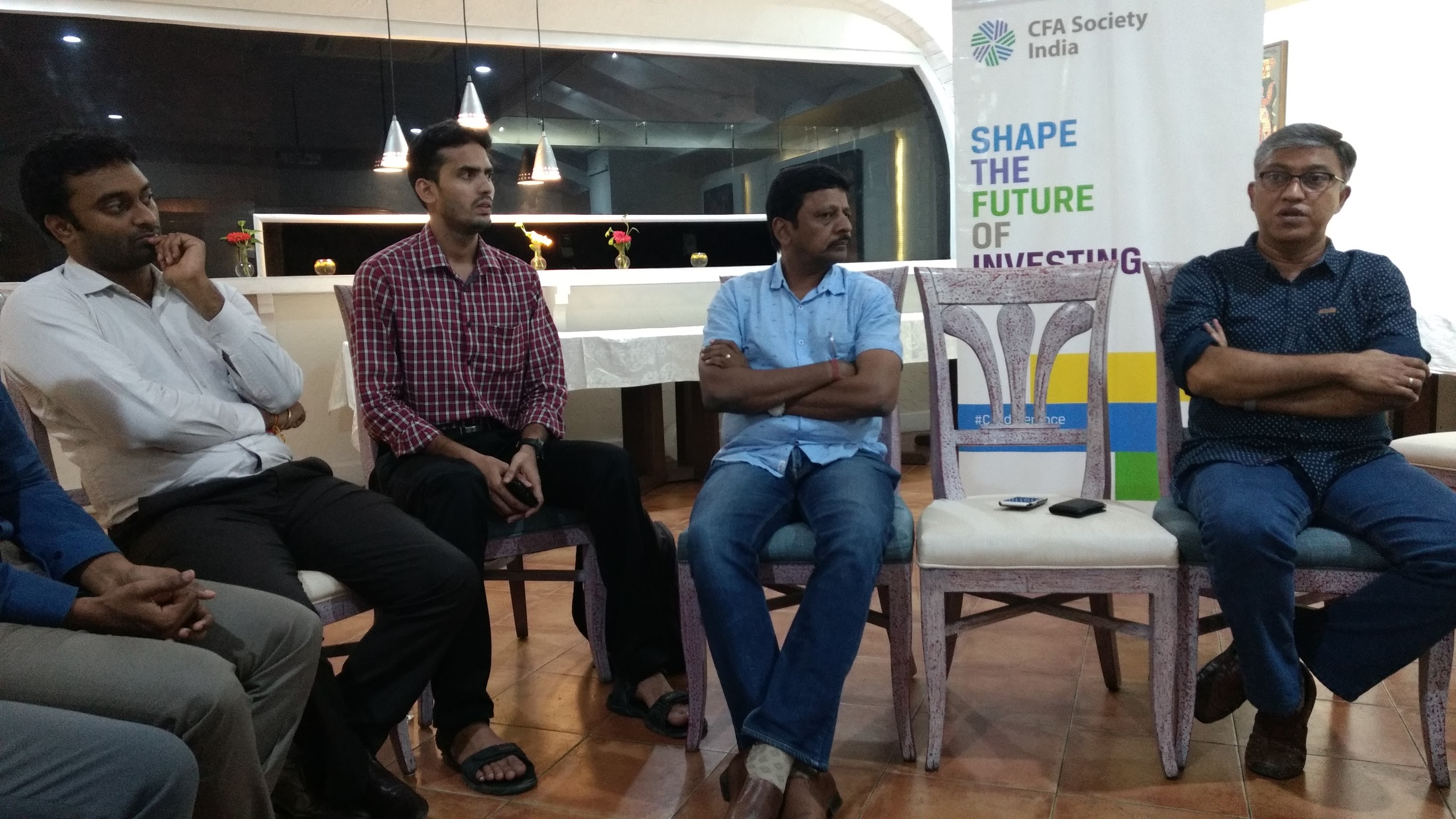- July 10, 2017
- Posted by: annlin@india.cfasociety.org
- Category:BLOG, Chennai, Events, Speaker Events
Contributed by: Meera Siva, CFA

June 2, 2017, Chennai
Is the start-up investment eco-system hot or feeling the heat? K A Srinivasan (KAS), Partner & CFO – Ventureast shared his views on the past and present state of VC investments, challenges in the Indian start-up ecosystem and the future, especially of tech ventures.
KAS focuses on Fintech and Food tech sectors and oversees fund administration, investor reporting, valuation and deal structuring besides helping portfolio companies in designing their internal controls and monitoring processes. He has over 25 years of experience in finance & accounting and operations across multiple verticals – Manufacturing, Processing and Services. Prior to Ventureast, he ran his own Finance and Accounting Outsourcing (FAO) business, and sold it to Aditya Birla group. Earlier, he was the Global Finance Controller for Sutherland Global Services and had held several senior positions in A V Thomas group and managed their agro operation. KAS is a Chartered and Cost Accountant.
Return expectations
Start-ups typically start bootstrapped operations with funds from family and friends, followed by angel funding and/or seed funding. The first institutional level fund raising from Venture Capital firms starts from Series A or sometimes from Pre Series A. VC firm will participate at least two more rounds and post that PE will enter.
Investing in early stages means there are higher risks as there is not much data/numbers available. One needs to understand the operations, segment to place a bet. About 25% of investments give good returns 8-10x. About a fourth give 1-2x return. Another fourth may give 0.5-1x return and the rest is written off. So, for the portfolio, a return of 3x is a decent expectation. Ventureast’s first fund gave a 6x return, in mid 2000s.
On individual investments, VCs look for 10x return (to make up for the many that may fail). The return expectation for PE is 3x as failures are lower. At angel stage, risks are higher and return expectation is 20-30x. More and more later stage investors are moving to earlier stage to catch start-ups young and at lower valuations (with hopes of higher returns).
E-commerce story
There was a valuation boom and now gloom in the e-commerce segment. But the fact is that e-commerce has great potential and much of the pain is self-inflicted. Back-end technologies – such as helping to reduce return rates in shoes, clothing – as well as personalization options without adding to inventory, will aid e-commerce penetration. India lags China big time and as internet and mobile penetration increases, there is huge potential. In segments such as grocery, the likes of BigBasket are making good inroads. Convenience, which is leading to adoption by the newer generation will help its growth to become a billion-dollar company.
Cash on delivery (CoD) is a big issue for e-commerce, as return rates are over 60% in this segment. Moving to digital payment methods will help etailers. Also adding charges for delivery if the goods are not accepted may be needed to reduce losses.
There is less investment seen in brick and mortar businesses, except for hospitals. Others such as retail, food, infra and energy are not seeing much interest. In food, though overall sector CAGR is 10-15% growth, the same store sales growth for restaurants are not good and there is a lot of churn due to changing user tastes.
Promising tech story
Technology – artificial intelligence, big data analysis – hold a lot of promise and many firms are getting funded. AI based service industry is gaining traction. One example is Docsapp where initial data gathering is done through machines, saving doctors time.
Fintech is a space which is not a winner-take-all model (unlike marketplaces such as Amazon or cab aggregation such as Uber). Technology plays a major role in loan origination, credit appraisal, Disbursement and collection. Algorithm based credit appraisal and risk analysis are gaining momentum. Aadhar makes eKYC faster and social network crawling, CIBIIL score, bank statement through Perfios makes the credit appraisal quicker and reduce the Turn Around Time. Fintech companies are focusing on getting primary data of the borrowers through POS or WEBPOS which makes the credit appraisal more robust. SMS crawling, contact filtering makes the collection better.
Issues to sort out
While the outlook is good, there are issues to sort out. One is the scale up challenge, Two, there is still challenge in finding good talent, for example, a suitable co-founder.
Three, there are high expectations from founders on valuations at Series A level. If series B is not able to live up to Series A valuation, it becomes tough to raise money at Series B since new investors will be reluctant to come in at the down round. It is advisable to have a convertible structure at Series A with more management incentive if the promoters able to raise the value. that will be more sustainable.
Four, founders should be numbers savvy. They should understand the business metrics very well. Else, they should rope in a good financial expert from the start.
-MS
